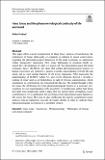Files in this item
Hans Jonas and the phenomenological continuity of life and mind
Item metadata
| dc.contributor.author | Prokop, Mirko | |
| dc.date.accessioned | 2022-11-09T12:30:08Z | |
| dc.date.available | 2022-11-09T12:30:08Z | |
| dc.date.issued | 2022-11-08 | |
| dc.identifier | 282079831 | |
| dc.identifier | 8d8e961c-3b42-469a-b46b-bf90cb625a4e | |
| dc.identifier | 85141558877 | |
| dc.identifier | 000880237000001 | |
| dc.identifier.citation | Prokop , M 2022 , ' Hans Jonas and the phenomenological continuity of life and mind ' , Phenomenology and the Cognitive Sciences , vol. First Online . https://doi.org/10.1007/s11097-022-09863-1 | en |
| dc.identifier.issn | 1572-8676 | |
| dc.identifier.other | RIS: urn:CDC3D1FE2495EFA38EC2D2088658EE09 | |
| dc.identifier.other | RIS: Prokop2022 | |
| dc.identifier.uri | https://hdl.handle.net/10023/26343 | |
| dc.description | Funding: The research leading to this paper received financial support from the German Academic Exchange Service (DAAD, Scholarship ID: 57503736) and an Accommodation Award of £1,500 (GBP) by the University of St Andrews. | en |
| dc.description.abstract | This paper offers a novel interpretation of Hans Jonas’ analysis of metabolism, the centrepiece of Jonas’ philosophy of organism, in relation to recent controversies regarding the phenomenological dimension of life-mind continuity as understood within ‘autopoietic’ enactivism (AE). Jonas’ philosophy of organism chiefly inspired AE’s development of what we might call ‘the phenomenological life-mind continuity thesis’ (PLMCT), the claim that certain phenomenological features of human experience are central to a proper scientific understanding of both life and mind, and as such central features of all living organisms. After discussing the understanding of PLMCT within AE, and recent criticisms thereof, I develop a reading of Jonas’ analysis of metabolism, in light of previous commentators, which emphasizes its systematicity and transcendental flavour. The central thought is that, for Jonas, the attribution of certain phenomenological features is a necessary precondition for our understanding of the possibility of metabolism, rather than being derivable from metabolism itself. I argue that my interpretation strengthens Jonas’ contribution to AE’s justification for ascribing certain phenomenological features to life across the board. However, it also emphasises the need to complement Jonas’ analysis with an explanatory account of organic identity in order to vindicate these phenomenological ascriptions in a scientific context. | |
| dc.format.extent | 26 | |
| dc.format.extent | 1103101 | |
| dc.language.iso | eng | |
| dc.relation.ispartof | Phenomenology and the Cognitive Sciences | en |
| dc.subject | Hans Jonas | en |
| dc.subject | Enactivism | en |
| dc.subject | Phenomenology | en |
| dc.subject | Philosophy of biology | en |
| dc.subject | Life-mind continuity | en |
| dc.subject | B Philosophy (General) | en |
| dc.subject | T-NDAS | en |
| dc.subject | NIS | en |
| dc.subject.lcc | B1 | en |
| dc.title | Hans Jonas and the phenomenological continuity of life and mind | en |
| dc.type | Journal article | en |
| dc.contributor.institution | University of St Andrews. University of St Andrews | en |
| dc.contributor.institution | University of St Andrews. Philosophy | en |
| dc.identifier.doi | https://doi.org/10.1007/s11097-022-09863-1 | |
| dc.description.status | Peer reviewed | en |
This item appears in the following Collection(s)
Items in the St Andrews Research Repository are protected by copyright, with all rights reserved, unless otherwise indicated.

